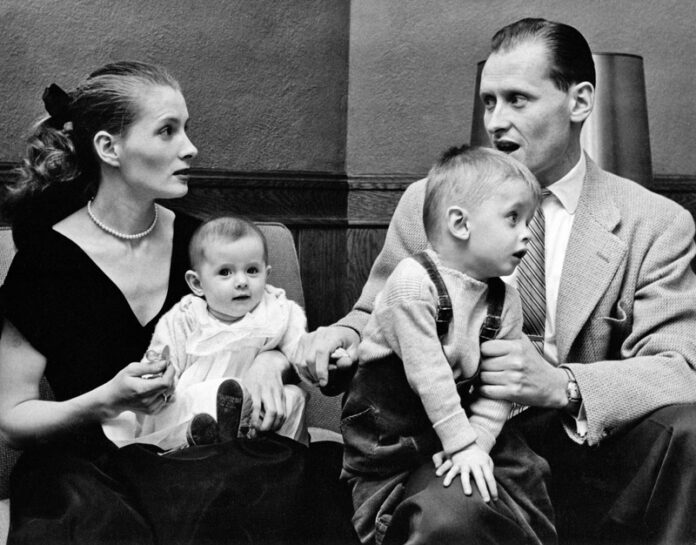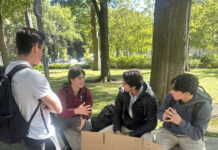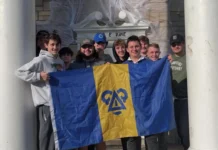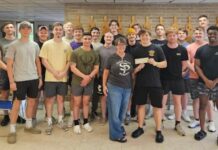At the height of the Hungarian Revolution in November 1956, Steve Bullock ’57 pitched an idea to his Delta Upsilon (DU) fraternity brothers: to “adopt” a family of Hungarian refugees. Three months and a series of miracles later, a Hungarian family of four moved into the DU fraternity house in Williamstown.
Fraternity brothers spurred into action
Bullock conceived of the adoption after he and his fraternity brothers watched a news broadcast about the Soviet Union’s brutal response to the Hungarian uprising, Bullock told the Record in an interview. “Everyone was stirred up about it,” he said. “It just seemed like a decent thing to do to give these people a place to live.”
According to a Jan. 12, 1957, Record article, each DU brother agreed to increase his monthly dues from $2 to $4 in order to support the incoming family. “We’d spend [a few hundred dollars] a month on one party for the girls,” Bullock said. “I thought we could do something for one family — something really worthwhile — not just partying and all that.”
Several other campus fraternities sought to help out in various ways as well. Zeta Psi organized a clothing drive for Hungarian refugees in Austria, the Record reported on Dec. 12, 1956. Similar to DU, Phi Delta Theta offered to cover room and board for a Hungarian student to enroll at the College, and later the College agreed to pay the student’s tuition, the Record reported on Feb. 6, 1957. That same February, Phi Delta Theta welcomed 25-year-old Gabor Teleki ’61, a Hungarian immigrant who enrolled at the College and earned a degree in physics.
“Fraternities have a reputation … but every now and then something bright happened,” Bullock said. “I don’t think we meant for this to be a great thing for the fraternity, it just seemed like something the people ought to do.”
{…}
A Town-wide effort
Bullock rallied people across the College and Town to support the Csanádi family. The family’s living expenses were covered by DU and St. John’s Episcopal Church, and they received clothing and furniture donations from Town residents, Bullock said. They received additional support from the Williamstown National Bank, whose president offered the family a temporary stay in his home. Community members helped find a job for Oswald at Sprague Electric in North Adams.
DU planned to support the family for one year until the Csanádis became self-sufficient. After arriving to campus, the Csanádis lived in an apartment in the back of the DU house — which stood where Garfield House stands today — for about a month before moving into a house on Cole Avenue, where they then lived for three years.
Even though the Csanádis eventually moved away from the DU house, the fraternity brothers stayed involved in their transition to life in Williamstown. Mária invited them to her home for a lunch of Hungarian goulash each Thursday, various brothers helped transport the family members around town, and Oswald mowed the DU house’s lawn, Bullock remembered.
The Csanádis gradually found ways to overcome the language barrier through local translators, Bullock said. The owner of the Northside Motel at the time spoke Hungarian, and the Hungarian photojournalist Lucien Aigner — a Great Barrington resident who became famous for his photos of Albert Einstein — helped get the family settled. One fraternity member, George Erlanger ’59, was able to speak German with Oswald, too.
Bullock faced some criticism for the move to host the family. After he was credited with the idea in several newspaper articles, he said, a woman from North Adams wrote him a letter asking why they focused their money on supporting Hungarian refugees rather than combating poverty in local areas. But the majority of the people supporting the family were thrilled to be involved, Bullock said.
{…}
To reunite 66 years later: ‘A wonderful grand finale’
Oswald Jr. and Beata Csanádi plan to return to Williamstown this June to attend the 65th reunion for the Class of 1958.
“I’m absolutely thrilled at being reconnected with our DU sponsors, and am very much looking forward to meeting them next month,” Beata wrote. “I’d also love to track down any surviving community members who helped us as well.”
Scarborough and Bullock are equally excited for the reunion. “We’re trying to get some of the classmates to come, or if they can’t come, to write letters for [the Csanádis] to put in a book,” Scarborough said. “It’s just a miracle that everything has come together.”
Beata is grateful to have restored her connection with the College. “I honestly don’t know if my parents ever tried to reconnect; they were always so busy working, raising us kids,” Beata wrote. “Connections were of course more difficult to rekindle before the internet… I believe the desire, however, was always there. I’m just grateful Steve decided to look through his old newspaper clippings and took the initiative.”
“It’s just marvelous, and it completes the circle,” Scarborough said. “It is a wonderful grand finale.”























